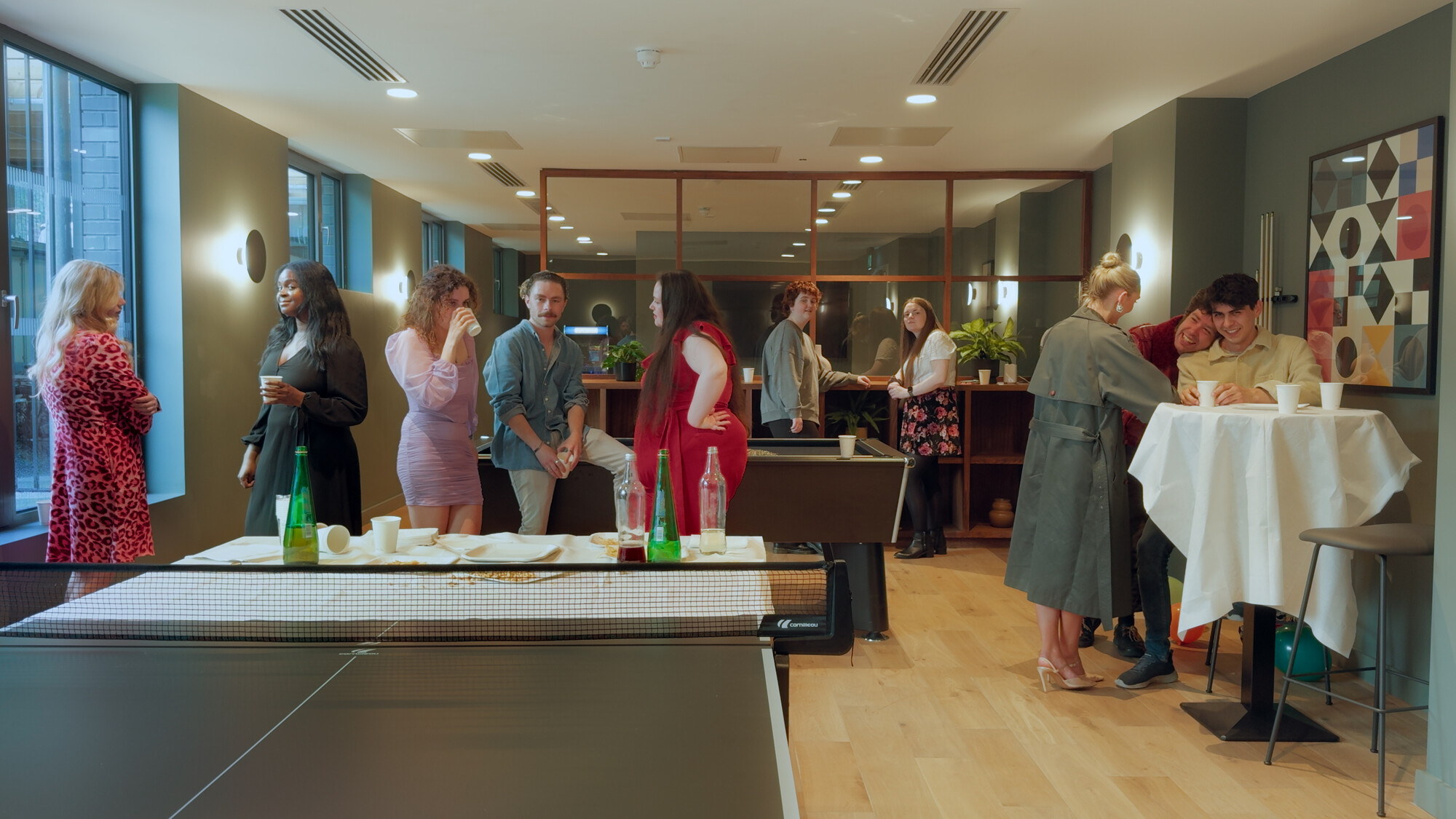
Programme 2025
Eva Richardson McCrea, Owen Maseko, Zoé Samudzi, Jenny Brady, Ciarán Ó Dochartaigh
Project Arts Centre
39 East Essex Street
Temple Bar
Dublin
Ireland
Hours:
Monday–Saturday 11am–5pm
T +353 1 881 9613
Project Arts Centre is pleased to share our 2025 Visual Arts exhibition programme.
Eva Richardson McCrea’s film The Decameron / Na Deich Lá departs from Giovanni Boccaccio’s 14th century book of short stories wherein ten young people flee to a villa outside Florence in order to escape the Black Death pandemic. In this new work, ten protagonists and their frame story are relocated to a contemporary co-living development near Dublin where they ‘live, work and play’ together. Aimed at a young, affluent and globally transient workforce, co-living developments function to normalise housing crises in an age of loneliness by redefining the concepts of home and living. Through focusing on experience and convenience over space and privacy, living becomes a service that is provided, and the notion of a stable home is replaced by home as a subscription.
The work was made covertly while the artist stayed as a resident in a co-living development, and the characters and plot lines were generated through a series of workshops in Character-Based Improvisation. Shot on site and entirely on iPhone, the work combines scripted and contingent elements and draws on a range of motifs, themes and tropes from literature, television, theatre, self-help guides, social media and advertising, among other sources.
Curated by Zoé Samudzi, this upcoming exhibition by Zimbabwean painter Owen Maseko seeks to engage the traumatic memory of the Gukurahundi, the four-year genocidal targeting of Ndebele people by Zimbabwean government forces. Maseko’s painted work and accompanying text in isiNdebele communicate a cultural and national history of minoritization and the affective politics of “dissidence.” Brought into the Irish context, Maseko’s work illuminates the potency of the native tongue against cultural and linguistic imperialism: the power of the political imaginary and precision of memory that one’s own language affords, as well as the transnational possibilities for solidarity.
Zoé Samudzi is the Charles E. Scheidt Visiting Assistant Professor of Genocide Studies and Genocide Prevention at the Strassler Center for Holocaust and Genocide Studies at Clark University. She is a Global Blackness Research Fellow at the Johannesburg Institute for Advanced Study at the University of Johannesburg. She is also a writer and an associate editor with Parapraxis Magazine.
In her new film installation, The Glass Booth / An Both Gloine, Jenny Brady casts a cinematic gaze on the figure of the interpreter, examining the origins of the interpreting profession and the contemporary landscape of interpretation. First employed prominently during the Nuremberg Trials, simultaneous interpretation is closely linked to conflict resolution, bilingualism, and the establishment of the United Nations. Through vignettes set in both extreme and familiar environments, the film portrays the processes of listening, speaking, and forgetting within acts of formal and informal interpretation. In this fragmented portrait, The Glass Booth highlights the often-hidden work of interpreters and its complex, intersubjective nature.
Ciarán Ó Dochartaigh’s Vague symptom clinic considers Ireland’s legacies of colonialism, partition, and state violence, and their relationship to intergenerational trauma and inherited chronic illness. The exhibition’s title is taken from the real-life National Health Service (NHS) clinic that attempts to identify the origins or causes of a range of indefinite indicators of disease, including weight loss, fatigue, brain fog and night sweats. Ó Dochartaigh makes sculptural installations with materials including blown glass, silicone, ice, lard, metal, diagrammatic images, sound recordings, electronic components and bespoke medical tools made of ceramic, marble, and granite.
Project Arts Centre works with artists, thinkers and other practitioners on exhihibitions, public programmes, research, and publications.
